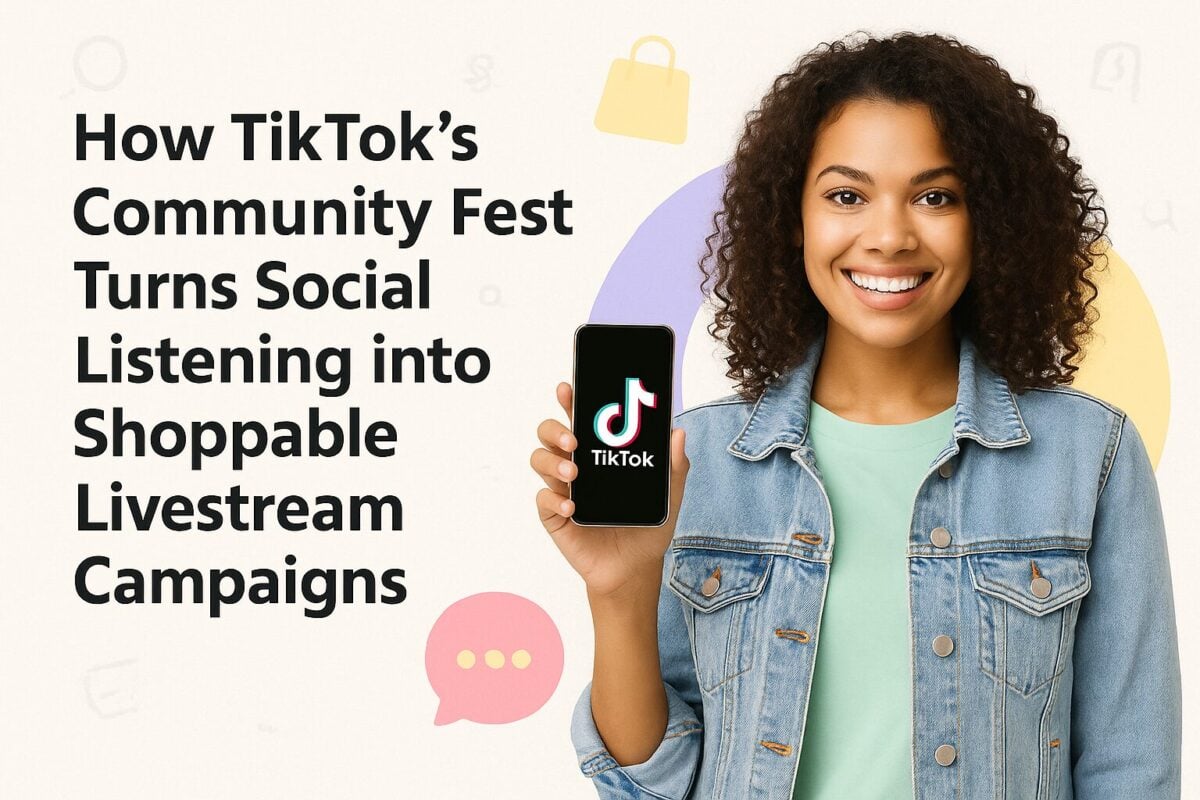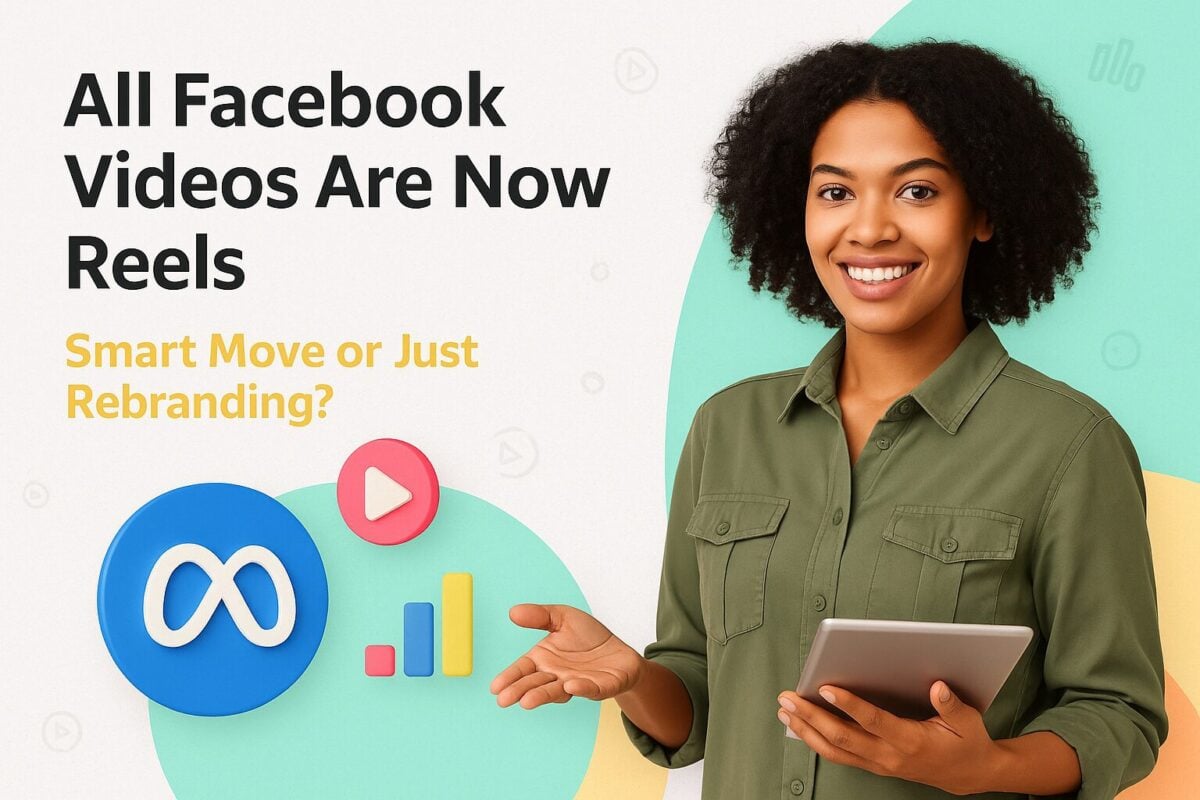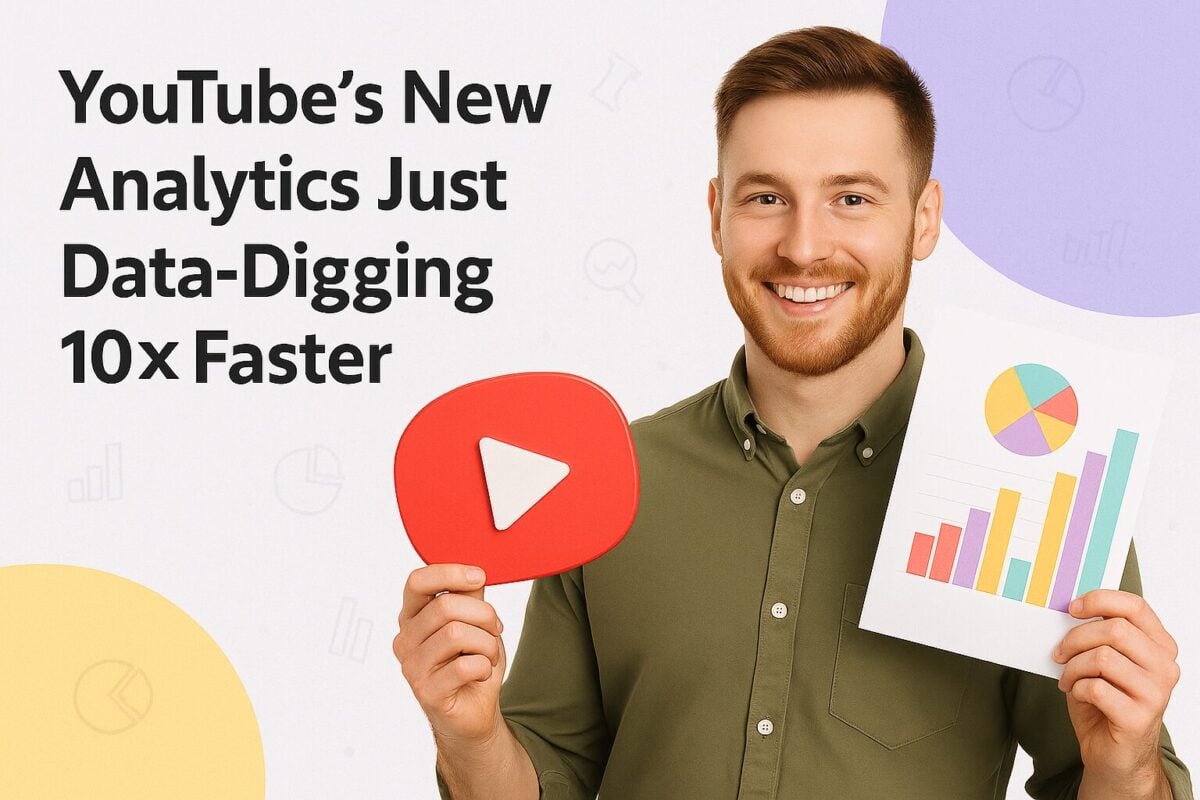Many business owners try to handle all aspects and challenges of their business, but expertise is crucial. You can’t be everywhere or know everything at once. Outsourcing to professionals, like a social marketing agency, can save time and money.
Beyond daily posts, effective social media marketing involves actively listening, responding, engaging, and monitoring the audience. Creating resonant content is vital to growth and adding real value. As social media evolves, companies increasingly outsource marketing to digitally focused agencies for scalable results. A full-service social marketing agency brings these skills and expertise to grow your business and expand your online presence in 2024.
21 Questions to Ask Your Prospective Social Media Marketing Agency:
- 1. What guides your social media marketing approach?
- 2. What sets you apart from other agencies?
- 3. Do you outsource your work?
- 4. Who comprises your clientele, and in which industries do you specialize?
- 5. How do you create a social media strategy for a new client?
- 6. Can you share measurable goals you’ve set for similar clients?
- 7. How do you stay updated on the latest trends and algorithm changes?
- 8. Which social media platforms do you suggest for my brand?
- 9. What social media tools do you use?
- 10. What are your content plans?
- 11. What do you need from me?
- 12. How do you ensure a consistent brand voice across all social media platforms?
- 13. How do you boost community engagement?
- 14. How do you manage negative comments or crises on social media?
- 15. What KPIs matter in social media campaigns?
- 16. How often will I receive reports, and what’s in them?
- 17. Who will handle my account?
- 18. How will we communicate?
- 19. How is your pricing structured?
- 20. How can you guarantee optimal return on investment (ROI)?
- 21. Can you outline your strategy for our brand’s social media growth in the upcoming years?
- Frequently Asked Questions
Must-Ask Questions Before Hiring a Social Media Agency
Given that over 91% of marketers operate on social media, the importance of the platform is evident. That’s where a social media agency comes in handy.
However, choosing a social media agency is akin to dating. Patience, thorough research, and asking pertinent questions upfront are essential. Below is a list of questions a proficient social media agency should readily address.
Background Check and Work Assessment
1. What guides your social media marketing approach?
Understanding a social media agency’s philosophy is crucial to ensure alignment with your brand. It reveals their core values and whether they suit your business. It’s like looking under the hood, understanding what drives their strategies beyond the shiny exterior. Their response provides insights into how they plan, execute, and measure campaign success and their adaptability to social media trends.
For instance, some agencies like Disruptive Advertising adopt a data-driven approach, relying on analytics to make decisions. This might not be the best match if your business values creativity over data. Instead, you can look into Sociallyin, which offers customized creative content. Knowing their values ensures alignment with your goals, leading to more effective campaigns. Understanding their philosophy ensures a harmonious partnership, not a clash of priorities.
2. What sets you apart from other agencies?
To quickly assess their fit for you, ask them to compare themselves with competitors. Find out:
- if they are niche-specific
- if social media marketing is their exclusive focus
- what their key services are
- how they handle their own social media channels
- what makes them unique
Marketing agencies differ in size and client focus. Some exclusively specialize in social media, while others integrate it with broader digital marketing services. Certain social media agencies may also extend into related services like influencer marketing. For instance, the social media agency Viral Nation also specializes in influencer marketing.
3. Do you outsource your work?
Transparency about outsourcing shouldn’t be a deal-breaker but crucial information. Assessing if an agency outsources is necessary to know its operational model. This inquiry reveals if the agency maintains control over critical aspects of your campaign or delegates tasks externally. Knowing this is vital for evaluating accountability, communication channels, and potential variations in work standards.
For example, if content creation is outsourced without stringent oversight, it may impact the consistency and quality of your social media content. Asking this question provides clarity, mitigates risks, and facilitates smoother collaboration.
While many businesses outsource to cut costs, making sure their in-house team handles crucial tasks like content development and social media strategy is essential. Be aware of which parts of a campaign are being outsourced.
4. Who comprises your clientele, and in which industries do you specialize?
Clients validate an agency’s success. Assessing a social media marketing agency’s clients and industry focus is essential to understanding their knowledge of your business. Expertise in a specific industry implies tailored strategies that can boost your brand.
Knowing their client portfolio and industry focus aids in selecting an agency aligned with your marketing needs. While not all firms disclose agency partnerships, agencies typically provide an approved list of references. Video testimonials offer authenticity, as opposed to written ones, which can be manipulated.
When seeking references, ensure relevance to your business. For instance, if you’re part of the B2B industry, request references from similar professionals. Explore case studies and blog posts featuring clients, like NinjaPromo’s client and industry webpages, for insights into agency performance.
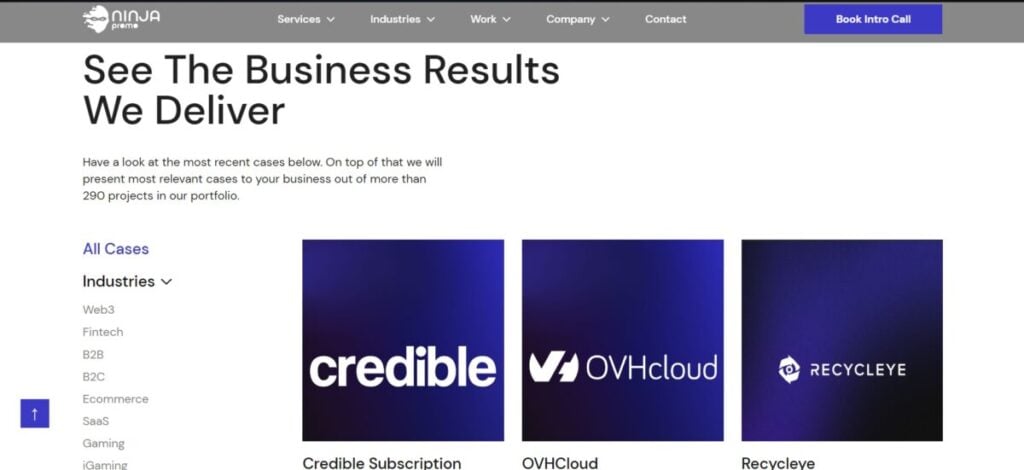
Source: ninjapromo.io
Strategy and Planning
5. How do you create a social media strategy for a new client?
The answer to this question will showcase the agency’s process, commitment to research, and alignment with your brand. It will also highlight how well (so far) they understand your needs, audience, and industry.
At this initial point, you don’t need a detailed step-by-step process, but the agency should clearly outline realistic steps in their approach. Request examples of both successful and unsuccessful campaigns. If they claim no failures or mistakes, consider it a red flag.
A reputable digital marketing agency outlines its strategy, which may involve:
- Setting SMART goals
- Understanding your audience, considering age, location, income, job title, interests, and habits
- Analyzing competition through tools like Hootsuite or Brand24
- Conducting a social media audit to evaluate engagement, identify strengths and weaknesses, and recognize valuable partnerships
- Establishing and enhancing accounts, selecting social networks, and defining individual strategies
- Developing a social media content calendar with the right content mix
- Crafting purpose-aligned, compelling content for each network
- Monitoring performance and making necessary adjustments
Numerous digital marketing agencies, like SmartSites, provide specialized social media management and strategy services. SmartSites conducts thorough discussions about your goals and target audience, crafting a strategy tailored to your business's unique requirements. Their social media management includes analyzing your audience, industry, effective calls to action, and pertinent metrics for result assessment.
Focus on understanding why they do what they do, not just what. Clarity on their methodology ensures the proposed strategy is intricately designed for your unique challenges and opportunities in your market.
6. Can you share measurable goals you’ve set for similar clients?
This question offers a glimpse into the agency’s past success and ability to establish SMART goals tailored to your industry. It assesses their dedication to results and proficiency in tracking key performance indicators (KPIs).
For example, if they achieved a 20% increase in website traffic for a client within three months through a targeted social media campaign, it showcases their ability to deliver tangible results. This insight helps evaluate their effectiveness in aligning goals with your objectives and their track record in achieving measurable success for comparable clients.
Avoid vague promises; request case studies. Concrete examples ensure you choose an agency with a proven ability to set and achieve goals, making a real business impact for your company.
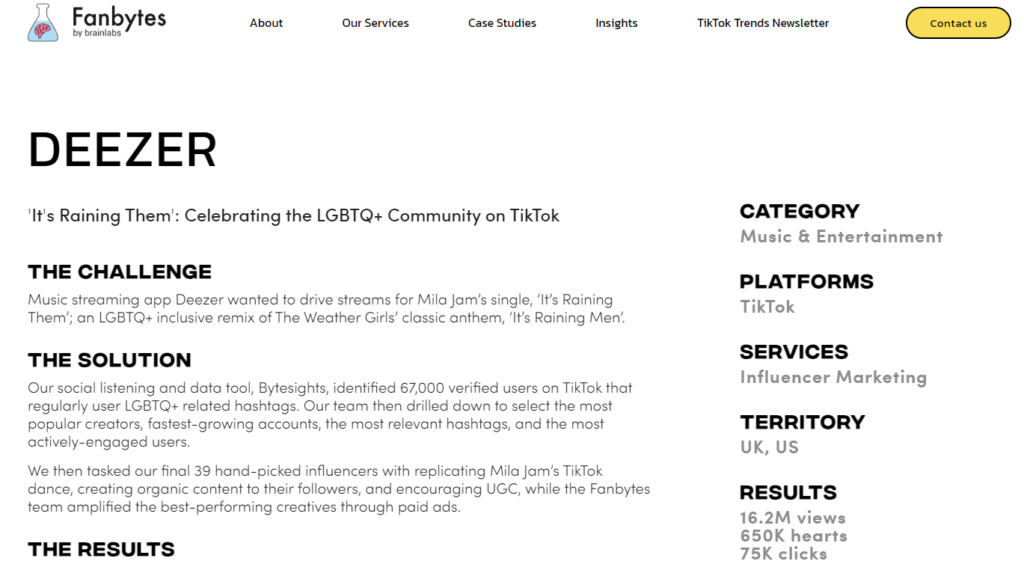
Source: fanbytes.co.uk
7. How do you stay updated on the latest trends and algorithm changes?
In the dynamic digital landscape, platforms and features evolve rapidly. Even minor algorithm tweaks can significantly impact reach and engagement. An agency unaware of these changes may hinder your content’s visibility.
As such, make sure to ask:
- How do you stay informed about the latest trends in social media?
- Who are the industry experts and blogs you follow?
- What tools do you use for analyzing social media in real time?
- Do you attend social marketing seminars?
- Do you participate in webinars or take online classes?
For instance, creator marketing is a big trend this year.
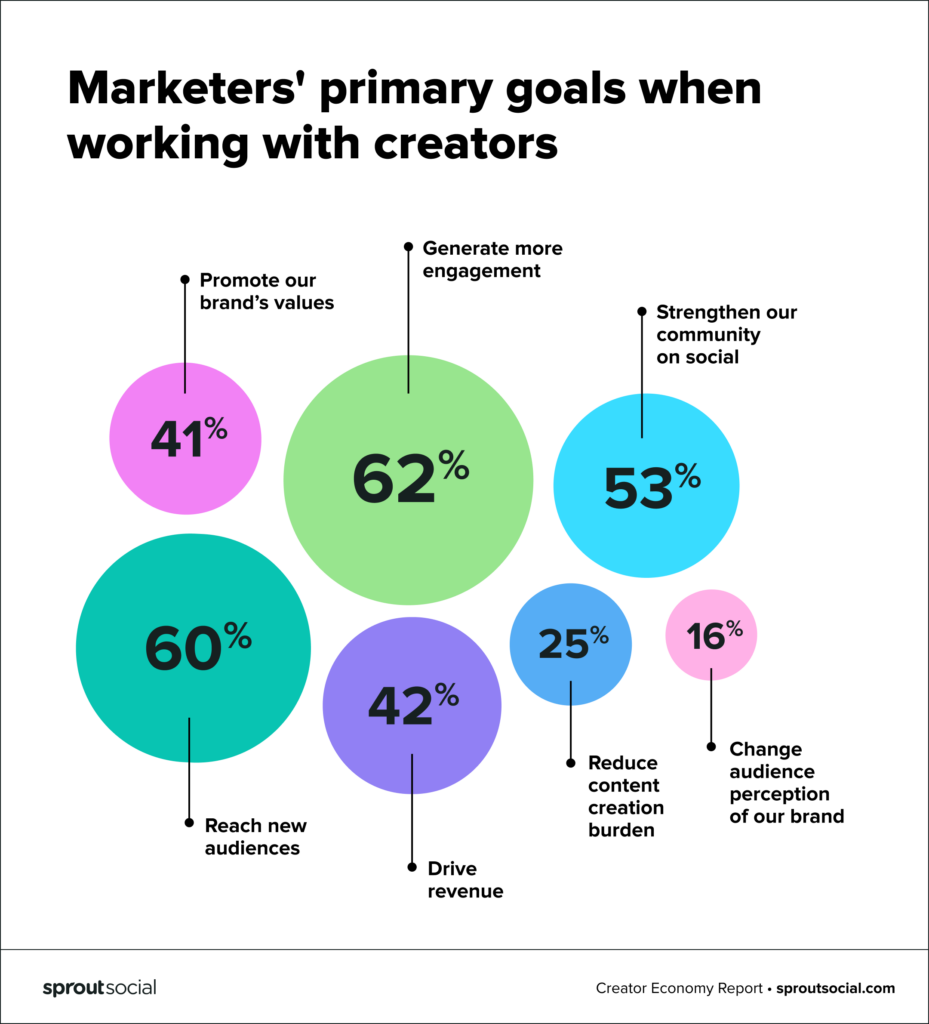
Source: sproutsocial.com
Ensure the agency stays at the forefront of new trends by understanding their learning practices. This insight ensures they navigate the ever-changing social media landscape, keeping your campaigns relevant and effective.
Content Creation and Management
8. Which social media platforms do you suggest for my brand?
Various platforms cater to diverse demographics and engagement styles, each fitting different brand needs. One size does not fit all; platform recommendations should align with your brand’s voice and values. Avoid spreading yourself thin on all platforms; focus on those relevant to your brand and audience.
A good agency tailors recommendations based on your brand message, audience, and goals, emphasizing a customized strategy. Be cautious of agencies proposing plans beyond two to three platforms for small or medium-sized businesses. A strategic approach begins with one platform before branching out.
Also, keep in mind that beyond mainstream platforms like Facebook, Instagram, TikTok, LinkedIn, X, and Pinterest, there are other top social media platforms that your business can leverage like:
- WhatsApp, with 2 billion monthly users, provides a business platform for customer support.
- WeChat, with 1.3 billion monthly users, is great for promoting brands in China and other locations in Asia.
- Snapchat, having 557 million monthly users, suits brands targeting teenagers with its vertical video format.
9. What social media tools do you use?
Understanding the agency’s toolset is crucial for gauging its technological proficiency, efficiency, and analytics depth. A reputable agency values leveraging tools for streamlined processes, performance monitoring, and data-driven decisions.
They may highlight platforms like Hootsuite for scheduling and engagement, Sprout Social for analytics and reporting, and Brand24 for social listening. They could also mention tools like Canva or Adobe Spark for graphic design. This ensures the agency is well-prepared to navigate the dynamic social media landscape with advanced tools for effective strategy execution and trend anticipation.
A good agency goes beyond tool names, explaining strategic tools to achieve specific goals. For instance, they might discuss using audience insights from one tool to inform content creation in another or employing automation for enhanced campaign efficiency. This highlights their focus on using a specific tool to deliver tangible results.
10. What are your content plans?
Content forms the core of social media, involving regular posting and strategic considerations like what, when, and how to engage. Inquire about:
- Posting frequency
- Content tone (descriptive, formal, informal, conversational)
- Availability of skilled graphic designers and videographers
- Use of AI tools like ChatGPT for written content generation
A credible agency goes beyond content types, considering audience demographics and goals like brand awareness or lead generation. For example, a tech startup might get ideas for YouTube explainer videos, interactive polls on X, and industry news on LinkedIn. A travel business might get suggestions for destination video tours, user-generated content contests, and live Q&A sessions with travel bloggers.
11. What do you need from me?
Clarify responsibilities, asking if you need to provide content. Establish what the agency expects from you during the campaign, understanding if they provide images or require industry news contributions. This insight reveals the time demands as you embark on collaboration.
Discuss the time commitment as well. Part of the reason you outsource social media management is time constraints. If the agency demands excessive time from you, defeating the purpose, reconsider. Yet, be wary of agencies claiming they need nothing from you; your brand representation requires some involvement. Seek an agency striking the right balance.
12. How do you ensure a consistent brand voice across all social media platforms?
A consistent brand voice builds a strong identity, fostering familiarity and trust. Reputable agencies establish strategies for this, creating comprehensive brand guidelines covering personality, tone, language, and messaging. These guidelines ensure uniformity across platforms. They may suggest a content calendar for planning and visualizing the brand voice. Regular social media audits help maintain consistency, with adjustments as needed.
If you’re still defining your brand’s social media tone, draw inspiration from Map & Fire to identify your voice using brand archetypes.
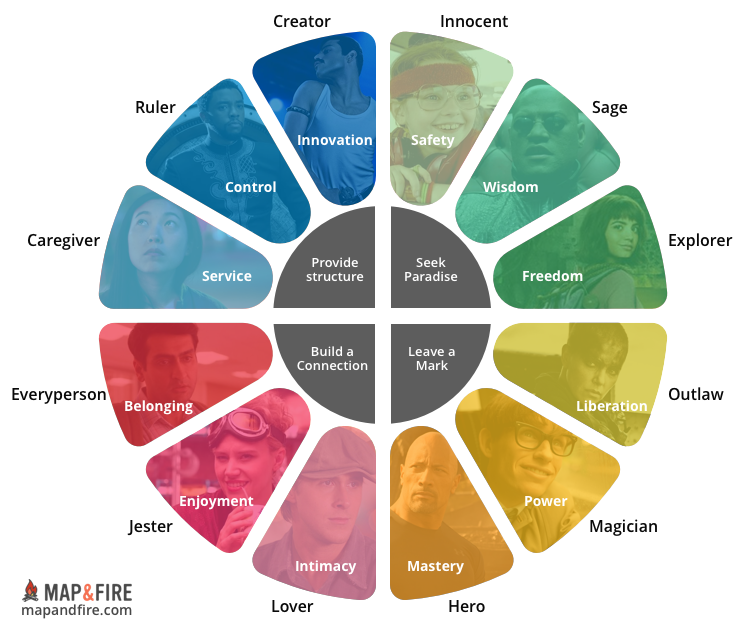
Source: mapandfire.com
Your chosen agency can then reinforce this voice for trust and recognition.
Engagement and Community Building
13. How do you boost community engagement?
A robust community yields brand loyalty and valuable user-generated content. A good agency tailors their approach to your goals, asking about your target audience, brand values, and desired community vibe. It employs a multi-faceted approach, including:
- a diverse mix of content
- targeted outreach to influencers
- active two-way communication
- initiatives to encourage UGC and sub-communities
For instance, Airbnb’s successful campaigns showcase effective community engagement. They leverage user-generated content, fostering authenticity, community, and user engagement on Facebook and Instagram.
While community management is necessary, it can become costly. Look for agencies aiming to cut costs, especially for small businesses. Determine if community management is optional, and inquire how they handle questions they don’t know how to answer. This insight helps decide whether to manage community engagement in-house or leave it to the agency.
14. How do you manage negative comments or crises on social media?
Ensuring an agency’s proficiency in handling negativity and crises is vital for assessing reputational risk management. A reputable agency prioritizes prompt and diplomatic issue resolution, preserving brand image and customer trust. They may outline a crisis management plan, incorporating real-time monitoring tools like Brandwatch or Mention and predefined response protocols.
A good agency goes beyond damage control, presenting proactive strategies such as:
- Tailored Responses: Adjusting the approach based on the severity and nature of negativity, addressing issues with factual corrections, or de-escalating emotional exchanges.
- Platform-specific Strategies: Recognizing platform nuances and adapting responses to address negativity effectively.
- Harnessing Positivity: Involving brand advocates and loyal customers to counter negativity, fostering positive sentiment.
Analytics and Reporting
15. What KPIs matter in social media campaigns?
KPIs can be overwhelming, with metrics for digital marketing, social media, email, and eCommerce. Aligning with an agency starts by defining shared goals and success metrics. While most social media agencies may agree on essential metrics, understanding how they perceive success provides vital insights. A reliable agency tailors its approach to your objectives, explaining how it tracks specific KPIs aligned with your goals.
A good agency also digs into:
- Multi-Channel Tracking: Assessing campaign performance across platforms, identifying areas for improvement.
- Benchmarking and Competitor Analysis: Comparing progress with industry standards and competitors to ensure alignment.
- Iterative Optimization: Continuously adapting strategies based on KPI insights, aiming for continuous improvement.
When assessing an agency’s experience, be cautious of vanity metrics that might impress on paper but don’t align with meaningful engagement or business goals. Don’t hesitate to share your input. They may offer expertise, but you know your business best, so you know which metrics matter.
16. How often will I receive reports, and what’s in them?
Regular reports from your social media marketing agency reveal transparency, accountability, and their impact on your business. An upright agency emphasizes the importance of consistent reporting, offering comprehensive reports within structured schedules (monthly or quarterly).
The content of reports matters. Inquire about the tools used for reporting; a good agency focuses on actionable insights, covering:
- campaign performance
- audience demographic and behavior
- competitive analysis
- insights and recommendations.
Team and Collaboration
17. Who will handle my account?
A trustworthy agency will provide a dedicated team tailor-made for your goals and communication style. A solid agency will have a structured team of content creators, community managers, ad specialists, and analysts.
When you’re presented with your account manager(s), ask follow-up questions like:
-
Do you have experience in my industry?
A reputable agency showcases the team’s track record with similar accounts through case studies and testimonials, ensuring a solid fit.
-
How much time will you spend on my social media daily/weekly?
A transparent agency outlines the time to manage, monitor, and optimize your accounts or campaigns. If they avoid this question, be cautious – clarify the value of the time you’ll be paying for.
18. How will we communicate?
A reputable agency should be able to provide a structured communication plan that details update frequency, preferred channels, and designated contacts for accurate and consistent communication. Do they prefer face-to-face or video meetings? Use tools like Slack or Asana? Collaborate with remote teams or other agency partners? Direct access to the team or only through an account manager?
Service and accountability matter. Knowing protocols establishes a smooth working relationship, reducing misunderstandings and enhancing collaboration.
Budget and ROI
19. How is your pricing structured?
Understand where your money goes. Request a detailed breakdown of costs, including advertising, content development, and personnel expenses. A trustworthy agency prioritizes transparency, separating specific services, hourly rates, and potential additional costs. Transparent pricing structures, distinguishing between retainer fees, project-based, and performance-based models, ensure you fully understand the value of the services.
Here’s a quick look at advertising costs in social media for 2024:
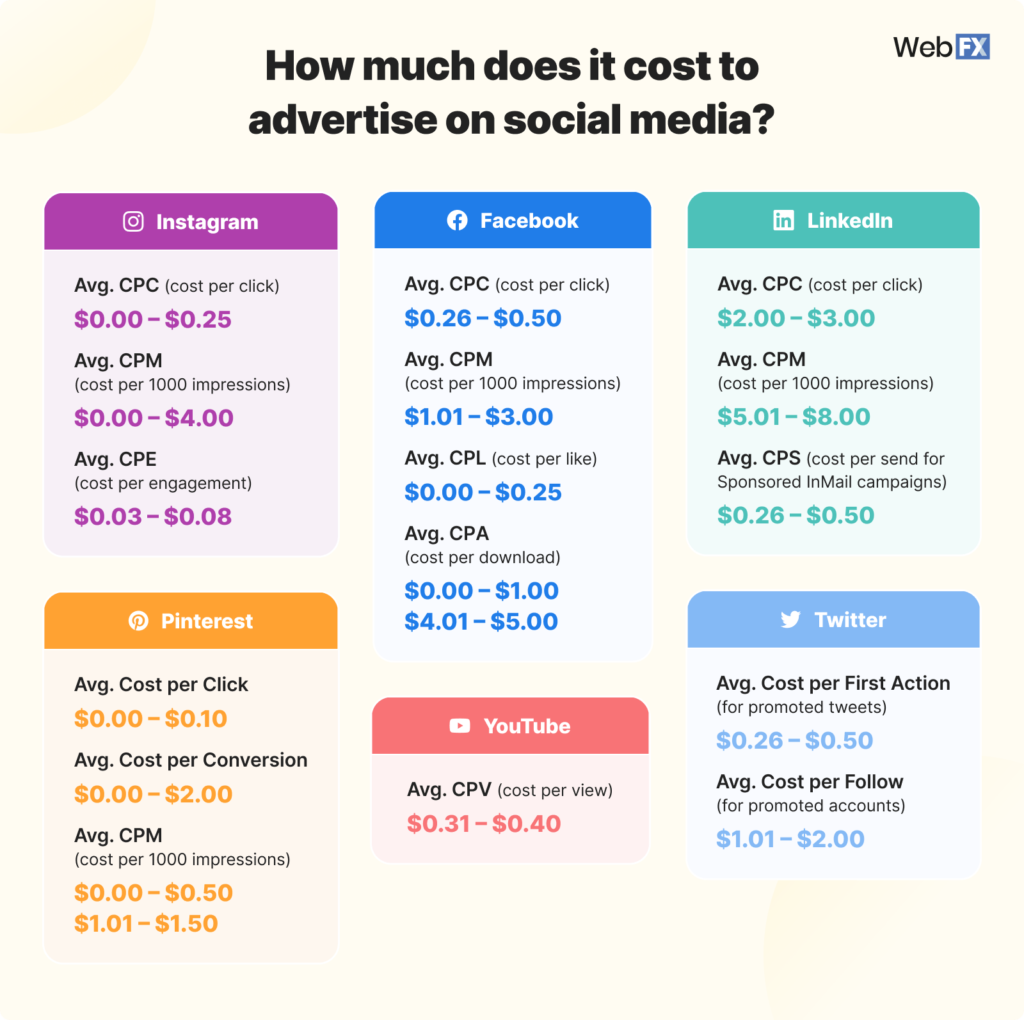
Source: webfx.com
Additionally, a good agency adapts pricing to your goals and budget, offering customized packages within your financial constraints. This flexibility showcases their commitment to fostering a sustainable partnership.
20. How can you guarantee optimal return on investment (ROI)?
Ensure the agency is committed to delivering impactful results by understanding its approach to maximizing ROI. A reliable agency recognizes the nuanced aspects of social media advertising ROI, addressing factors like targeting, ad creative, and campaign optimization. They also conduct further strategies such as audience segmentation, A/B testing, and data analysis tools to refine ad performance continually.
Be cautious of agencies promising swift and significant ROI, especially when you’re just starting to build your brand. Successful social media marketing campaigns take time.
A good agency prioritizes data-driven decisions, utilizing analytics tools for performance tracking, identifying successful elements, and adjusting targeting, ad copy, and budget allocation. This iterative process ensures continuous improvement and efficient use of your advertising budget.
Understand how to measure social media ROI to avoid misinformation. Methods include using templates available online, applying the ROI formula for financial and non-financial costs, and utilizing online ROI calculators like Hootsuite’s Social ROI Calculator.
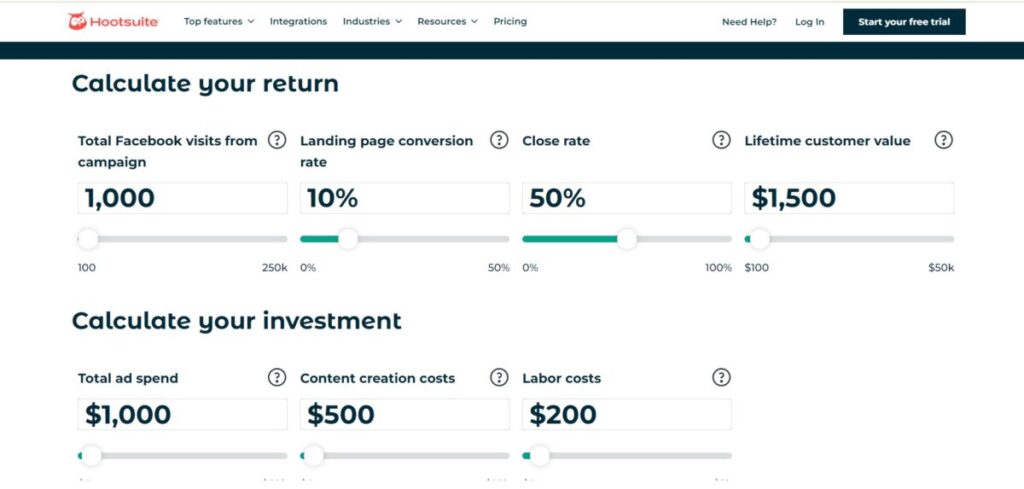
Source: hootsuite.com
Future Planning
21. Can you outline your strategy for our brand’s social media growth in the upcoming years?
This question gauges an agency’s strategic planning and commitment to long-term collaboration. A reputable agency will articulate a forward-looking plan, demonstrating proactive thinking beyond immediate goals. This vision should integrate market trends, audience insights, and innovative approaches for sustained growth.
A reliable agency presents its vision as a collaborative journey, inviting your feedback. This demonstrates a commitment to a partnership where both parties are invested in long-term success, fostering trust and mutual growth.
Bonus Question
Include a bonus question unrelated to social media marketing to gauge creativity and critical thinking, which are valuable traits for a strategic partner. Examples of bonus questions:
-
How would you describe the color silver to someone visually impaired?
-
What personality traits would you assign to the vowels in the alphabet, and why?
-
What would it be if you could invent a new word for “parents”?
Final Thoughts
Choosing a social media agency aligned with your business needs is challenging, but asking pertinent questions simplifies the process. Customize the questions based on your unique considerations. This list above provides a solid starting point for productive discussions. Ultimately, the final decision is yours, so exercise your judgment to determine the best fit for your business.
Frequently Asked Questions
How can a social media agency benefit me compared to doing it myself?
Agencies bring dedicated teams with specialized knowledge covering various platforms, content creation, and analytics. They craft a data-driven strategy tailored to your audience and brand goals. Also, handling day-to-day social media tasks allows you to focus on essential business functions.
What should I consider when choosing a social media agency?
When evaluating social media agencies, check for:
- Experience and industry knowledge
- Case studies and portfolio
- Team qualifications and skills
- Communication skills
- Reporting and transparency
Is hiring a freelancer instead of an agency a viable option?
Certainly. Freelancers work well for smaller projects or businesses with limited budgets. However, agencies offer broader services, expertise, and experience.
